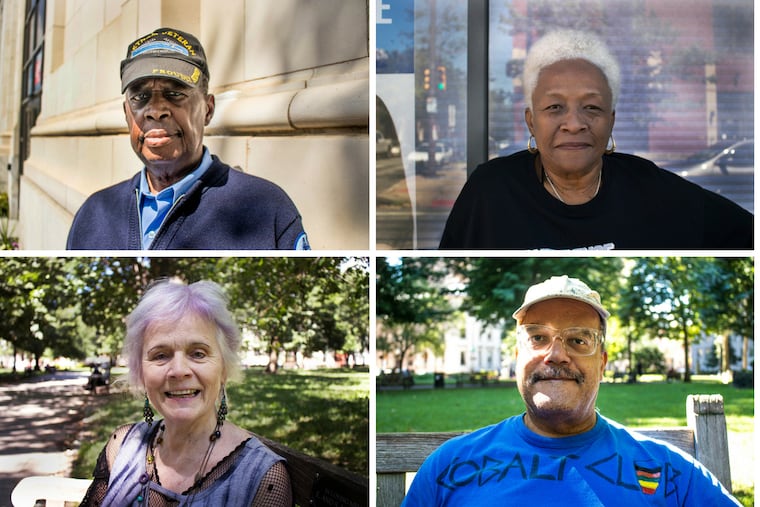When were you most worried about America? Philadelphians share their stories
Over 70 percent of Americans believe that this country's democracy has reached a "dangerous low point." For many people, that translates into deep concern over the current state of our nation and what will happen in the future.

Over 70 percent of Americans believe that this country's democracy has reached a "dangerous low point." For many people, that translates into deep concern over the current state of our nation and what will happen in the future.
But America has survived turbulent times in the past. Many Americans have worried about the future of this country before and seen issues resolve and evolve over and over again.
That experience and perspective can help us now, so the Inquirer and Daily News asked Philadelphians of a certain age to share stories of when they've been worried about the future of the United States.
Answers have been edited lightly for style and clarity.
“I graduated from high school the day after Robert Kennedy was killed.”
"In the spring of 1968, Martin Luther King was killed and then Robert Kennedy was killed. I graduated from high school the day after Robert Kennedy was killed and that summer I went to work in the Mississippi Freedom Democratic Party in a coalition with a lot of other groups to seed an integrated delegation at the Democratic National Convention in Chicago that year. So I went down to work with them. I think what a lot of us did was join an organized movement — in this case around racial justice. So the concern was not left behind. Like so many other people, we didn't sit at home and worry. We went out and joined an organized campaign."
“She said, ‘You can’t eat here.’ “

“We’d lie under the desk — like that was going to protect us.”
"[One time] I was afraid was in 1950. I was 7 years old then. I was listening to the radio, and when you hear things on the radio when you're 7 years old, you take it seriously. I heard someone on the news say, 'By 1955 the Russians will have bombed us,' and I believed it. I was always afraid, and in those days, we always had air-raid drills. We'd lie under the desk — like that was going to protect us. I still remember January 1, 1956, I breathed a sigh of relief and said to myself, 'We survived.' I actually believed we were going to be bombed."
“There was a whole rash of assassinations.”
"I think the scariest time for me was the day that John F. Kennedy was assassinated. I remember that day because it was probably the saddest day that I can recall. I was in grade school. I think I was in sixth grade, and we were let out early from school. I just remember there was this silence all around the city. There wasn't much traffic. It was completely quiet all over. There was a strong sense of remorse. Of course, when I got home, my parents were watching it on television. I just felt like, 'Who could've killed the president?' I mean, the president was next to God. I just couldn't imagine a future for America if someone was evil enough to kill the president. During that period there was a whole rash of assassinations including Malcolm X, Martin Luther King, Medgar Evers. It signaled a whole dark period for America. It was difficult. I was trying to just hang on to my own dreams. Even as a child I still had this existential awareness that something better had to happen."
“I did three tours in Vietnam.”
"I'm kind of passive after [serving in the Vietnam War] and then being able to come home. I accept things as they are, as they continue to change. Even during the war [I didn't worry] because they kept us in the dark about what was going on. We would get letters from home and they would tell us about the war going on, the war we were fighting. [When I got home from Vietnam], I couldn't get a job. I was going to school, but it was difficult. I went to Temple. We were going to school in groups because kids were throwing rocks at us, spitting on us. That was difficult. But I got through it. The VA benefits were hard to get, but at that point I had acquired some patience and realized life was never going to be the way I wanted it to be. It was America. But I'm glad to be here. I couldn't wait to get home. I did three tours in Vietnam and I'm just glad to be alive. This is an ever-changing country."
“My parents had just lived through the Depression.”
"I come from a family where politics was 'agh.' It was something that really didn't touch your life that much, no matter who came and went. No matter how bad they might be. But that's not to say we never had any worries about the future at all. I was raised in West Virginia. I didn't realize we were poor, but we were. My father was working in the coal mines and my parents had just lived through the Depression. If we didn't know where the next meal was coming from, then we were worried about that. … But we were insulated [from politics]. … I hope that the younger generation feels that they have the power to work together and take part. I'm worried that the future generation would be like me, that they would be complacent and when they see something happening, that they wouldn't act on it."